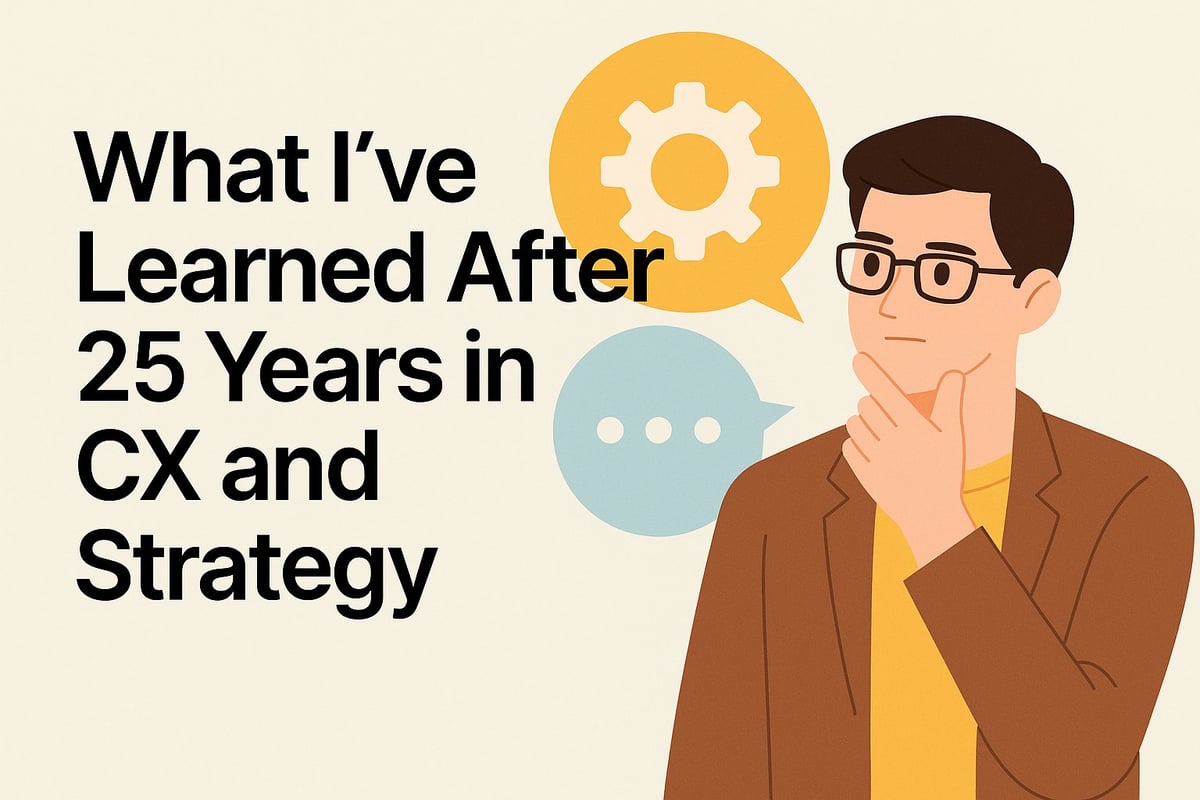Why I’m Writing This
When I started my career in customer experience, the term "CX" barely existed. But even then, I realized that the way companies made people feel was often more important than the product itself. What began as a curiosity turned into a lifelong journey — one that taught me how customer-centered thinking can reshape entire organizations.
How It All Started
My journey in CX began almost by accident. I was working in a large organization that was struggling to understand why customers were leaving, even though the products were competitive and the pricing was fair. One day, I sat in on a customer service call — and everything changed. The person on the other end wasn’t just dissatisfied; they felt ignored. That’s when I realized: metrics alone won’t save a business. You need to feel what your customers feel. That insight pushed me into a career focused on aligning businesses with real human needs.
CX Has Changed — and So Have Expectations
When I started, most CX work was reactive: surveys, complaint handling, service improvements. Today, it's proactive and strategic. Companies are finally seeing CX as a driver of competitive advantage, not just a support function. Emotional connection, journey mapping, and data-informed empathy are now central pillars of successful strategies. But the biggest shift? Customers expect more — faster, smoother, and more personalized than ever. Which means the mindset of constant improvement has never been more important.
3 Lessons From 25 Years in CX
These are not abstract theories — they come from real projects, real setbacks, and real conversations with teams across the world. Here are three insights that I believe every founder, product leader, or CX professional should internalize:
1. Strategy without empathy fails. You can have the best-designed roadmap in the world, but if it doesn’t resonate with your customers’ emotions and reality, it won’t stick. Real impact happens when business goals and human needs align.
2. Growth is not linear. Sometimes you need to pause, pivot, or even walk away. The most resilient founders and leaders I’ve worked with are those who treat uncertainty as fuel, not fear.
3. People over playbooks. Frameworks are great. But leadership, listening, and asking better questions always beat rigid methods. Especially in CX, where the human factor is everything.
A Moment I’ll Never Forget
I once worked with a financial services company that was losing high-value customers without knowing why. They had surveys, data, and dashboards — but none of them told the real story. So I spent a week talking to their frontline teams and key clients. What I found was simple: the onboarding experience created confusion and stress. They were optimizing for speed, not clarity. When we redesigned that journey, retention improved dramatically. It was a reminder that empathy beats efficiency when trust is at stake.
What This Means for You
Whether you're changing careers, launching a new venture, or trying to lead with more clarity — these lessons can help you avoid costly mistakes. You don't have to figure it all out alone. Mentoring, to me, is about offering honest feedback, real-world experience, and a sounding board when you need it most.
Practical Advice for Career Changers
If you're transitioning into CX or business strategy, don’t worry about knowing everything from day one. Start by asking better questions. Listen more than you speak. Learn how to tell a customer story with clarity and data. And above all, don't let complexity slow you down — focus on one experience, one process, one improvement at a time. The best CX leaders I know didn’t come from CX — they came from curiosity, compassion, and the courage to challenge the status quo.
Your First 90 Days in CX or Strategy — A Simple Roadmap
If you’re stepping into CX or strategy for the first time, the learning curve can feel steep. Here’s a simple guide to structure your first 90 days:
Month 1: Listen and Observe
- Talk to customers, frontline teams, and internal stakeholders.
- Map out existing processes and touchpoints.
- Look for emotional friction — where do people feel confused, frustrated, or disconnected?
Month 2: Analyze and Align
- Gather quantitative and qualitative insights.
- Prioritize based on business impact and emotional relevance.
- Align with leadership on key outcomes and expectations.
Month 3: Act and Communicate
- Launch one meaningful improvement, even if it’s small.
- Measure what matters (not just what’s easy to measure).
- Share progress transparently to build momentum and trust.
Remember: strategy isn't about being the smartest person in the room. It's about helping the organization make better decisions — and helping people feel seen, heard, and valued along the way.
The Value of Mentorship at Every Stage
One of the biggest misconceptions about mentorship is that it’s only for beginners. In my experience, some of the most powerful breakthroughs happen later — when you’ve already built something, but feel stuck, isolated, or overwhelmed. At early stages, mentorship helps you avoid common mistakes and gain clarity. In the middle, it becomes a mirror — helping you refocus and reconnect with your “why.” At senior levels, it’s about sharpening your thinking and expanding your impact.
I’ve been mentored by brilliant people at different moments in my life — and now I mentor because I believe in that same ripple effect. Mentorship isn’t about having all the answers. It’s about creating a space where better answers can emerge.
Summary and Invitation
If there's one thing I've learned after all these years, it's that strategy, growth, and leadership are never finished products. They are ongoing conversations — ones we must have with ourselves, our teams, and our customers. That’s what makes this work both challenging and meaningful.
If any part of this post resonated with you, I invite you to reach out. Whether you're navigating a transition, scaling your vision, or just need a second set of eyes, I’d be glad to support your journey.


